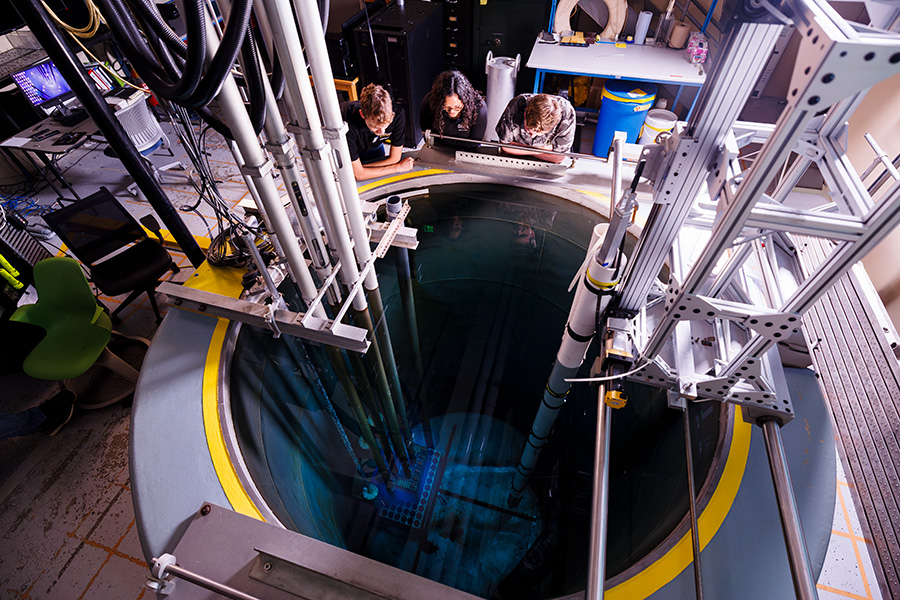Purdue launches nation's first online credential program in small modular reactors
WEST LAFAYETTE — Purdue University’s School of Nuclear Engineering is launching the first online credential program in small modular reactors (SMRs) in the nation, addressing the need for more reliable, flexible power generation to meet growing electricity demand.
The graduate-level professional credential program was announced Nov. 5 at the Global Nuclear Energy Economic Summit, hosted by Purdue and the state of Indiana.
The new program will expand concerted efforts by Purdue’s top 10 nuclear engineering school and the state to propel adoption of SMRs, which a Purdue-led feasibility report found could drive economic growth through job creation and industrial advancements while providing a 24/7 source of clean electricity.
“Their successful deployment could position the state as a national hub for advanced technology supply chains — reaffirming Indiana’s role as the crossroads of American manufacturing and helping to transform the ‘Rust Belt’ into a ‘Resilient Energy Belt,’” Seungjin Kim, the Capt. James F. McCarthy, Jr. and Cheryl E. McCarthy Head and professor in the School of Nuclear Engineering, wrote in an article for the Indianapolis Business Journal.
Scheduled to begin in spring 2026, the program will augment Purdue nuclear engineering’s existing leadership in nuclear research and facilities, as well as collaboration with the state of Indiana and industry and academic partners.
Smaller, safer and more efficient than traditional nuclear reactors, SMRs are gaining traction as a better alternative for meeting rising electricity requirements as new technologies, including AI, increase pressure on the power grid. Citing the Purdue-led report, Indiana Gov. Mike Braun in July signed landmark legislation and set a moonshot goal to bring SMRs to the state in eight years.
Uniquely positioned to tackle a grand challenge
“The US nuclear economy cannot take off without a talent supply chain. Purdue Engineering is uniquely positioned to help nuclear energy workforce development for our state and nation —from skilled trades to engineers,” said Arvind Raman, the John A. Edwardson Dean of Purdue’s College of Engineering. “We have the nation’s first and only comprehensive digital twin of a nuclear reactor which is key for workforce training, and we are the recipient of the largest grant ever from the DoE’s Nuclear Energy University Program with workforce as a key focus. Launching the nation’s first SMR credential program builds on that legacy and will help scale our nuclear energy workforce development effort nationally.”
“Our credential program will provide a platform for professional engineers in various engineering disciplines to acquaint themselves with new advanced reactor technology and help mitigate workforce needs for SMR technologies,” Kim said.
According to the U.S. Department of Energy, the nation’s current nuclear reactor fleet employs approximately 100,000 people, and that number is anticipated to rise to 375,000 by 2050 with the deployment and commercialization of advanced reactors.
Preparing an interdisciplinary workforce
“Our program will encompass a wide swath of engineering and science disciplines, all of which need to be represented in the nuclear energy workforce,” Kim said. “With nuclear energy being considered for a wide range of applications, our students may include not only nuclear but also mechanical and materials engineers, along with semiconductor and data science specialists as well as chemical, civil, industrial engineers and more.”
Applicants should hold a bachelor’s degree in engineering or science.
Four modules will progress from the basics to specialized areas. The first module, “Evolution in Nuclear Technology,” to be introduced this spring and taught by Kim, will impart basic knowledge on nuclear power reactor technologies, including nuclear energy and how nuclear power reactors work, the history of how nuclear power reactor technologies evolved, concepts for SMR/advanced reactor (AR) technologies, and unique attributes of SMRs and ARs. Modules to follow will cover such topics as SMR safety features and design enhancements, digital instrumentation and control systems, regulatory factors, cybersecurity, nuclear materials and fuels, advanced manufacturing for nuclear, and reactor management.
Early recognition
The credential program is earning praise already.
"With Purdue University having both its nuclear engineering program as well as the credential program, we'll be able to provide that depth in both the engineering and non-engineering workforce to help build the plants that we're going to need here in the United States,” said Indiana Secretary of Energy Suzanne Jaworowski. “We’re very fortunate to have that kind of workforce development here in the state of Indiana.”
"Purdue is one of the most highly ranked universities in nuclear engineering," said Hannah Pike, a Purdue PhD student in nuclear engineering. "We have amazing faculty across all areas, and there is definitely a wide range of disciplines nuclear engineering can touch, which shows the importance of the field and the credential."
Research innovator
The new credential program will leverage and complement Purdue Nuclear Engineering’s renowned research facilities, including:
- PUR-1, Indiana’s only nuclear reactor and the nation’s only all-digital nuclear reactor licensed by the U.S. Nuclear Regulatory Commission
- A unique first-of-a-kind digital twin of an operating nuclear reactor, which can perform pioneering research and training — for example, for testing how AI and machine learning can improve SMR performance and detect cybersecurity threats
- The Purdue University Multidimensional Integral Test Assembly facility, the country’s only light water-based AR test facility, being revitalized for SMR research, education and training
For more information on the credential program, click here.

